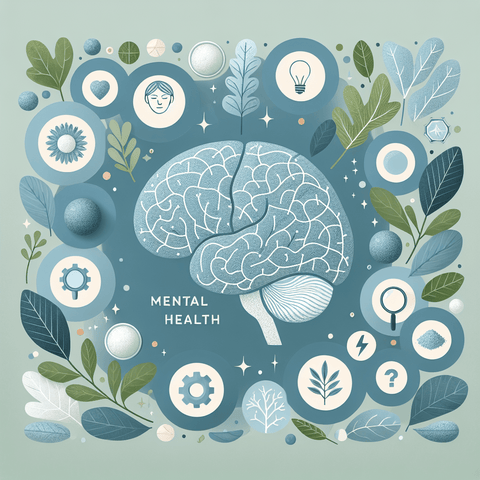Introduction
Magnesium is a vital mineral that plays a crucial role in over 300 enzymatic reactions in the human body. It is fundamentally involved in numerous physiological processes, including energy production, muscle function, and nervous system regulation. Despite its critical importance, magnesium remains one of the most underappreciated and under-consumed nutrients in modern diets—particularly in industrialized nations. Notably, emerging research and clinical observations suggest that magnesium exerts a significant influence on mental health, emotional well-being, and cognitive function. These areas are becoming increasingly relevant as more people seek natural and integrative ways to support their mental and emotional resilience.
In this blog post, we aim to explore the nuances of how magnesium impacts the psyche. We’ll examine its role in regulating mood, supporting cognitive clarity, managing anxiety, and contributing to neurological stability. Emphasis will be placed on how magnesium supplementation can play a supportive role in enhancing mental well-being. Furthermore, we’ll highlight the importance of choosing the correct form and dosage and offer practical guidance on integrating magnesium into a holistic approach to mental health. Whether you're exploring magnesium to support emotional balance, improve focus, or enhance stress resilience, this comprehensive guide based on evidence and practical insight will provide the knowledge you need.
Magnesium Benefits: Enhancing Mental Well-being Through Supplements
Magnesium is essential for a wide array of biochemical reactions throughout the body. It is heavily involved in ATP production—the energy currency of cells—as well as muscle contraction and bone mineralization. However, its impact extends far beyond the physical realm. One fascinating aspect of magnesium is its role in mental health, which has garnered increasing interest in both the scientific community and among health-conscious consumers.
Supplementing with magnesium has shown promise in modulating psychological functions. The mineral is a cofactor in the synthesis of neurotransmitters such as serotonin and dopamine, both of which are critical for mood regulation. Individuals who are deficient in magnesium often report symptoms like irritability, mental confusion, apathy, and increased susceptibility to stress and anxiety. As mental health challenges become more prevalent globally, nutrient-based interventions like magnesium are gaining traction as a safe, cost-effective adjunct to traditional treatment approaches.
Clinical trials have demonstrated that magnesium supplementation can lead to improvements in mood and cognitive performance in individuals with diagnosed deficiencies or suboptimal magnesium levels. Anecdotal evidence also supports these findings, with many individuals reporting improved sleep, enhanced focus, and increased emotional stability after consistent magnesium use. Importantly, the benefits of magnesium are highly dependent on its bioavailability, which varies among different supplement types. Magnesium citrate, glycinate, and malate are among the more bioavailable forms and are generally well-tolerated.
Choosing the right dosage is equally important. Daily requirements can vary based on age, sex, and lifestyle factors. The European Food Safety Authority (EFSA) recommends approximately 300–350 mg per day for adults, although individual needs may differ. High doses of magnesium from supplements may lead to gastrointestinal discomfort in some individuals, so it's wise to start low and gradually increase intake under the guidance of a healthcare professional.
For high-quality magnesium supplements, consumers can explore reliable products available at Topvitamine.com Magnesium Collection, which features various forms designed for absorption and minimal side effects.
Magnesium and Mental Health: Supporting Emotional Stability and Resilience
Magnesium plays a pivotal role in maintaining emotional balance and resilience, largely due to its effect on neurotransmitter regulation and the body's ability to manage stress. Neurotransmitters are chemical messengers in the brain that facilitate communication between nerve cells. Proper function of these systems is essential for mood regulation, emotional stability, and the brain's adaptive responses to stressors.
One way magnesium supports mental health is through the modulation of glutamate, an excitatory neurotransmitter, and GABA (gamma-aminobutyric acid), an inhibitory neurotransmitter. An imbalance between these two can lead to issues such as anxiety, irritability, or even cognitive dysfunction. Magnesium acts as a natural gatekeeper by binding to NMDA (N-methyl-D-aspartate) receptors, which regulate glutamate activity. This helps prevent overstimulation of nerve cells and promotes a state of calmness and equilibrium.
Evidence also shows that magnesium influences the hypothalamic-pituitary-adrenal (HPA) axis, the central stress response system in the body. An overactivated HPA axis can lead to chronic elevations in cortisol, the primary stress hormone, contributing to mood disorders and burnout. Magnesium helps moderate this response, enabling faster recovery from stress and restoration of physiological balance.
Several studies suggest a strong connection between magnesium status and mood disorders such as depression and anxiety. A 2017 randomized clinical trial published in PLOS ONE found that daily supplementation with magnesium chloride significantly improved measures of depression and anxiety compared to placebo. Participants reported improvements as early as two weeks into the study with minimal side effects, highlighting magnesium’s potential as an effective, low-risk intervention.
Incorporating magnesium into a daily supplement routine can be done with ease. For instance, magnesium glycinate is often recommended for its calming effect and high bioavailability. Some individuals may also choose to combine magnesium with other supportive nutrients such as B-vitamins or omega-3 fatty acids to enhance stress resilience. It's always best to monitor your mood and consult with healthcare providers to adjust dosages accordingly.
Magnesium Mood Support: Natural Aid for Emotional Balance
In today's high-stress world, mood swings, irritability, and emotional fatigue are increasingly commonplace. Interestingly, magnesium may be a key player in elevating mood and fostering emotional balance. Individuals suffering from frequent mood fluctuations often have lower levels of intracellular magnesium. Given its role in serotonin and dopamine synthesis, it's no surprise that balanced magnesium levels are associated with steady mood and emotional well-being.
One of magnesium's core functions in mood support is its capacity to promote relaxation and counter excitotoxicity—a condition where nerve cells are damaged and killed by excessive stimulation. By stabilizing cellular calcium flux and enhancing the activity of calming neurotransmitters like GABA, magnesium naturally soothes the nervous system. This makes it especially useful for individuals prone to irritability, mood swings, or emotional volatility.
Several scientific investigations underscore the connection between magnesium intake and emotional well-being. A comprehensive meta-analysis published in the journal Psychiatry Research reported a significant association between low magnesium levels and increased risk of depressive symptoms. Furthermore, some open-label studies have shown rapid improvements in depression scores among participants who began supplementation with magnesium within a matter of weeks.
Supplementing for mood support is straightforward, particularly when using forms that are gentle on the stomach and quickly absorbed. Magnesium l-threonate is a standout option because of its ability to cross the blood-brain barrier, directly impacting brain functions related to mood and cognition. Combining magnesium supplements with other supportive nutrients, such as vitamin D, may also offer synergistic effects, since both nutrients play a role in mental health regulation.
Beyond scientific studies, countless personal testimonies echo magnesium's efficacy as a mood enhancer. Many users report a sharper sense of calm, fewer mood swings, and improved overall emotional resilience after a few weeks of conscientious use. When selecting supplements, it’s essential to choose high-quality products from trusted sources, such as those available at Topvitamine.com’s Magnesium Collection.
Magnesium Anxiety Relief: Easing Anxiety Naturally with Supplements
Anxiety affects millions of people globally, prompting a significant need for effective and non-addictive treatment options. While conventional medications like SSRIs and benzodiazepines offer relief, they are not without side effects and dependency concerns. Magnesium presents a natural and increasingly popular alternative for alleviating anxiety-related symptoms.
Research suggests that individuals with anxiety often present with lower serum magnesium levels. This deficiency affects the nervous system by permitting unnecessary stimulation of neurons, leading to symptoms like restlessness, racing thoughts, and insomnia. Magnesium helps balance this by blocking excess calcium uptake in nerve cells and encouraging a calm, inhibitory response through GABA activation.
Several clinical studies have highlighted magnesium's anxiolytic properties. A notable 2010 review in the journal Neuropharmacology found that magnesium deficiency played a role in increased anxiety and dysregulation of the HPA axis. Additionally, randomized trials using magnesium oxide, citrate, or glycinate observed reduced anxiety levels in patients with mild to moderate symptoms.
Optimal dosage varies depending on the chosen form, individual tolerance, and baseline magnesium status. However, most studies suggest that 250-500 mg of elemental magnesium daily is effective for mild to moderate cases. Forms such as magnesium taurate and magnesium glycinate are often recommended for anxiety due to their calming amino acid components.
When comparing magnesium to other natural anxiety treatments like ashwagandha, L-theanine, or valerian root, magnesium often emerges as a foundational nutrient, enhancing the efficacy of other interventions. It is important, however, to monitor for potential side effects such as gastrointestinal upset. Starting with lower doses and choosing well-absorbed forms reduces this risk considerably.
To explore magnesium supplements aimed at easing anxiety, visit the Magnesium Health Collection at Topvitamine.com for curated, high-quality options.
Magnesium Neurological Effects: Supporting Brain Function and Nervous System Health
Neurological health is intrinsically linked to magnesium status. This mineral is vital for maintaining proper nerve conduction, promoting neuroplasticity—the brain's ability to adapt and reorganize itself—and protecting against cognitive decline. Its effect on neurological processes highlights magnesium’s potential in preserving brain health throughout life.
Magnesium modulates synaptic transmissions, which are necessary for neuronal communication. Adequate magnesium levels maintain the integrity of neurons by limiting harmful overexcitation and oxidative stress. There is growing evidence that magnesium may offer protective benefits against neurodegenerative diseases such as Alzheimer's and Parkinson's, although more long-term studies are needed to confirm causality.
Another crucial area is magnesium’s impact on sleep by regulating melatonin production and optimizing GABA activity. Sleep plays an essential role in neurological repair, memory consolidation, and emotional processing. Hence, magnesium’s ability to assist with sleep indirectly supports broader brain health initiatives.
Research conducted at MIT has highlighted magnesium l-threonate for its superior brain bioavailability. This form significantly raises the concentration of magnesium in the brain, contributing to improved memory, cognitive flexibility, and neuroprotection. It also bolsters age-related cognitive performance, lending it to increased use among aging populations and biohackers alike.
For nerve and brain support, synergistic combinations including vitamin K2 and fish oils like DHA/EPA supplements can further enhance neurological resilience. Always pair with medical advice, especially when using magnesium in the context of neurodegenerative concerns or alongside medications.
Magnesium Cognitive Enhancement: Boosting Focus, Memory, and Mental Clarity
Cognitive performance—defined by one's ability to focus, process information, and recall memories—can be directly influenced by magnesium levels. Named for its capacity to fine-tune neural communication, magnesium has emerged as a legitimate nootropic supplement. It balances excitatory and inhibitory neurotransmitters and indirectly influences brain-derived neurotrophic factor (BDNF), a protein associated with cognition and long-term memory.
Magnesium improves mental clarity by sustaining mitochondrial function in neurons and enhancing synaptic plasticity. In both animal models and human subjects, magnesium supplementation has demonstrated enhanced learning capacity, memory retention, and faster cognitive processing. These traits are particularly appealing for students, professionals, and aging adults keen on preserving mental sharpness.
Magnesium l-threonate again stands out due to its proven impact on short- and long-term memory in clinical research. A study published in Neuron found that increasing brain magnesium levels improved learning and memory in rodents, with findings showing promise for human correlations. Even in stressful environments or sleep-deprived states, magnesium helped maintain cognitive performance over time.
Pairing magnesium with other brain nutrients—such as acetyl-l-carnitine, lion’s mane mushroom, and omega-3 fatty acids—can amplify cognitive benefits. Proper hydration, physical activity, and sleep hygiene further support magnesium’s effects, creating a holistic cognitive enhancement strategy.
Those seeking to sharpen their mental acuity may explore cognitive-optimized magnesium products at Topvitamine.com. With options targeting brain absorption and function, enhancing mental performance becomes a more accessible goal.
Conclusion
Magnesium is a remarkable mineral with wide-reaching effects on human physiology, and particularly on mental health. From mood regulation and anxiety relief to neurological protection and cognitive enhancement, magnesium contributes profoundly to psychological well-being. Whether obtained through dietary sources or high-quality supplements, ensuring optimal magnesium levels can be a crucial pillar in a comprehensive mental wellness plan.
When considering supplementation, selecting the right form—such as glycinate for calm, citrate for digestion, or threonate for cognition—is essential. Dosages should align with personalized health needs and always be introduced incrementally for tolerance assessment. Trusted sources like Topvitamine.com ensure product quality and help users meet wellness goals with confidence.
As always, we encourage consultation with health professionals before undertaking new supplement routines. If you're already supplementing with magnesium and noticing benefits—or have questions—share your experiences with us. Your journey could help others on their path to better mental health.
Q&A Section
Q: How does magnesium support mental well-being?
A: Magnesium supports neurotransmitter function, regulates stress hormones like cortisol, and helps maintain a calm mental state by modulating GABA activity.
Q: Which magnesium form is best for mental health?
A: Magnesium glycinate and l-threonate are often recommended for mental health benefits due to their superior absorption and calming effects on the nervous system.
Q: Can magnesium help reduce anxiety?
A: Yes, magnesium can help alleviate anxiety by regulating excitatory neurotransmitters and calming the nervous system. Several studies support its use for mild to moderate anxiety.
Q: Is magnesium effective for memory and focus?
A: Magnesium, especially magnesium l-threonate, has shown promise in enhancing memory, learning capacity, and overall cognitive performance.
Q: Are there any side effects of magnesium supplements?
A: Common side effects include digestive discomfort at high doses. Starting with small amounts and using bioavailable forms can help avoid this.
Important Keywords
- magnesium mental health
- magnesium mood support
- magnesium for anxiety
- magnesium brain function
- magnesium supplements cognitive clarity
- natural supplements for mood
- magnesium l-threonate focus
- holistic mental wellness magnesium
- supplements for emotional stability
- magnesium supplements Topvitamine.com



